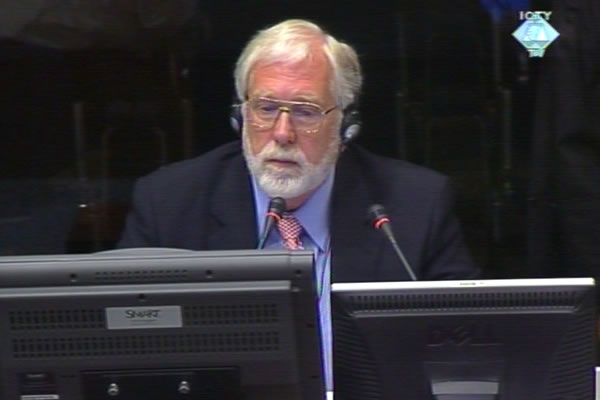Home
BOSNIAN SERB LEADERSHIP HAD SEPARATIST INTENTIONS
Radovan Karadzic continued his cross-examination of prosecution expert Robert Donia, who said the Bosnian Serb leadership pursued a separatist policy ‘long before Yugoslavia ran out of options’
 Robert Donia, witness at the Radovan Karadzic trial
Robert Donia, witness at the Radovan Karadzic trial Former Republika Srpska president Radovan Karadzic continued his cross-examination of prosecution expert Robert Donia today. Karadzic put it to the witness that the ‘first and foremost’ reason why tensions increased in BH was a policy shift on the part of the SDA leader, Alija Izetbegovic. In Karadzic’s opinion, until 30 January 1991 Izetbegovic was in favor of preserving Yugoslavia. Then, all of a sudden, Izetbegovic announced he intended to declare BH’s independence. This raised tensions, the accused contended.
The US historian didn’t agree with Karadzic’s suggestion, noting first that in late January 1991 Izetbegovic spoke about ‘a sovereign BH’, not about independence. Donia went on to list a number of even more relevant reasons why tensions increased in BH: the JNA support to the Serb separatists in Croatia, deployment of military forces along the border on the BH territory, parties arming their members, and the transfer of the JNA Uzice Corps to BH in September 1991.
‘The first and foremost’ priority of the Bosnian Serb leadership was to keep Yugoslavia going, because the Serbs had considered it as ‘their home’ from 1918. Donia agreed with that but rejected Karadzic’s claim that the Serbs favored an integral BH for as long as it was possible to keep Yugoslavia alive. ‘No’, Donia replied to Karadzic, ‘you engaged in separatist activities long before Yugoslavia ran out of options’.
According to Donia, the Bosnian Serbs’ ‘separatist’ intentions were reflected in the SDS endeavors to establish associations of municipalities in early 1991 and the so-called SAO (Serb autonomous regions) in the fall of 1991. Donia gave an example: the declaration of the Association of the Bosnian Krajina Municipalities on 25 April 1991. ‘You invited the representatives of several political parties, claiming that the associations were established primarily to support economic development of the municipalities; when the representatives arrived, you confronted them with Serb propaganda’, Donia said. Even Milorad Dodik, who represented the Reformists at the time, stated on the occasion that the formation of those associations was an expression of ‘political illiteracy’, demanding that the issue be discussed in the BH Assembly.
Donia also reminded Karadzic of the 17th session of the Bosnian Serb Assembly in July 1992. Vojo Kupresanin, president of the association of the Bosnian Krajina municipalities, said the regions had been established in order ‘to destroy Alija’s state’; further devolution of powers to the regions might ‘destroy even the new Serb state’ and it was necessary to centralize power.
Karadzic continues his cross-examination of Robert Donia – for which he had asked no less than 40 hours – tomorrow.
